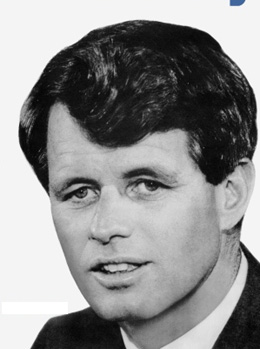On March 26, 1968, Senator Robert F. Kennedy (1925-1968) (D-NY), meets enthusiastic crowds in Seattle as he campaigns for the Democratic nomination for President of the United States. Speaking to more than 10,000 people at the University of Washington, and referring to the Vietnam War and the protests to it at home, Kennedy pledges "We can do better. There are no easy solutions to the strife at home to our course in Vietnam, but there are ways we can do better."
A Country Divided by the War in Vietnam
Senator Kennedy began his campaign ten days earlier when, on March 16, 1968, he announced that he would seek the Democratic nomination for president. In doing so he explicitly withdrew support from the incumbent Democratic President Lyndon B. Johnson (1908-1973), principally over the issue of U.S. policy in Vietnam.
Senator Kennedy arrived at Sea-Tac Airport from Portland and he drove to the Hec Edmundson Pavilion. There he was met by an enthusiastic crowd sprinkled with supporters of Senator Eugene McCarthy. Senator McCarthy was also running for the Democratic nomination, and his campaign also focussed on U. S. involvement in Vietnam.
Senator Kennedy received his loudest ovation when he said, "I think I can negotiate an honorable peace in Vietnam." The response from the college crowd was much less enthusiastic when he spoke of correcting "the inequities of the present draft system." The draft exempted matriculated college students. Men between the ages of 18 to 26 who were not enrolled in college were in the pool of draft-eligible men who were then drafted into the Army by lottery.
Senator Kennedy drove to his campaign headquarters at 522 Union Street in downtown Seattle and there spoke to a crowd on a bullhorn. He was "mobbed by teeny-boppers" on his way to the Olympic Hotel, where he spoke to 800 people in the Georgia Room, including his sisters Patricia Lawford (b. 1924) and Jean Smith (b. 1928).
The visit was characterized by its informality. Seattle businessman Jim Whittaker (the first American to climb Mount Everest) served as the Washington State Chairman of the Kennedy campaign. After Seattle, the campaign moved to Idaho.
On March 31, 1968, President Johnson announced to the nation that he would not seek nor would he accept his party's nomination for president. On June 4, 1968, Senator Robert Kennedy was shot by an assassin in Los Angeles after winning the California primary election. He died the next day.

